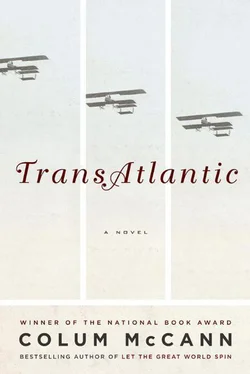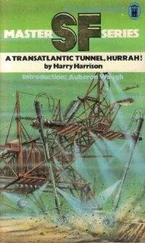A group of protesters had gathered on the far side of the street, men in shirtsleeves and wide suspenders. A row of policemen stood in front of them, arms linked, nonchalant.
Lily watched as Douglass lifted his head and glanced across as if in amusement. He held the hand of a white lady, guiding her into the carriage. His second wife. The shouts from the street grew louder as Douglass made a show of his manners.
He bowed to his wife and then came around to the other side of the carriage, dipped and turned sideways, then hunched his shoulders, got in. The horse was tall and elegant. It lifted its hooves and snorted.
Lily had the momentary thought that she should stride across, lean in the window, greet him, say her name, ask him to remember, but she stood instead in the shadows. What could she say? What further meaning might she get from saying her name? He might only feign recognition, or perhaps he would not remember at all. She had her daughter. Her sons. The lifting of ice.
Lily heard the jangle of the harness and a wheelcreak across the night. She ruffled the edge of her dress, and put her hand on Emily’s arm.
— Time to go home, she said. Come on.
STORIES BEGAN, FOR HER, AS A LUMP IN THE THROAT. SHE sometimes found it hard to speak. A true understanding lay just beneath the surface. She felt a sort of homesickness whenever she sat down at a sheet of paper. Her imagination pushed back against the pressures of what lay around her. Emily Ehrlich survived not by theory, or formula, but by certain moments of ease when she felt herself at full tilt, a sprinting, hurdling joy. Lost in a small excelsis.
The best moments were when her mind seemed to implode. It made a shambles of time. All the light disappeared. The infinity of her inkwell. A quiver of dark at the end of the pen.
Hours of loss and escape. Insanity and failure. Scratching one word out, blotting the middle of a page so it was unreadable anymore, tearing the sheet into long thin strips.
The elaborate search for a word, like the turning of a chain handle on a well. Dropping the bucket down the mineshaft of the mind. Taking up empty bucket after empty bucket until, finally, at an unexpected moment, it caught hard and had a sudden weight and she raised the word, then delved down into the emptiness once more.
THE FIRST-CLASS CABIN was small and white. Two beds. A portside view. Fresh flowers in a crystal vase. A welcome note from the captain. A chandelier that had been designed not to sway.
Announcements shot through the static of the loudspeaker, a steward’s nasal whine: dinnertimes, sunburn warnings, club alerts.
THEY HAD NEVER cared much for appearances, but on the first evening mother and daughter helped each other get dressed.
The water was calm, but even in the small pitch and roll it was difficult to comb each other’s hair. Emily propped a small round mirror in the porthole window. Her hair had gone gray. Lottie’s had been cut fashionably short. Beyond their own reflection, they could see the lines of moving shiplight on the sea.
The weight Emily carried dragged her down to the ground. She was fifty-six years old, though there were times the mirrors suggested a whole other decade on her face. Her ankles were permanently swollen, her wrists and neck, too. She wore her shoes two sizes too big. She walked with a cane. A dark blackthorn wood. A small knob of silver at the handle. A sleeve of rubber at the bottom. It had been fashioned for her by a craftsman in Quidi Vidi. She had a shy walk, conscious of the space she took, as if her body were waiting to acknowledge her discomfort, the space she took up.
Lottie — tall, redheaded, confident — wore a long taffeta dress, a baubled necklace against the curve of her throat. She was twenty-seven, with an air of earliness about her: she seemed to arrive ahead of herself. Mother and daughter were seldom apart. Caught by an orbit. Stitched together in opposites.
They sidled towards the dining room, Emily resting on her daughter’s arm. They stopped a moment in the entrance, surprised by the sight of a curving balustrade. Flowers were wrapped around the banister. A spectacle of wealth all around. Young men in dark suits and fly-collar shirts. Thin women with feathers in their hair, their necks strained, their arms outstretched. Businessmen gathered in groups, cigarette smoke swirling above them.
A bell rang and a cheer went up. The boat was far enough out to water. An opera of anti-Prohibition toasts unfolded. The air itself seemed to have already drunk several glasses of gin.
They were led to a table to sit with the ship doctor. A handsome Canadian with a curlicue of dark hair down the center of his forehead, his face lean and laugh-lined. In a well-cut shirt and arm garters. He leaned across the table towards them. The talk was of Lomer Gouin and Henry George Carroll, of a slight wobbling in the Stock Exchange, of corn prices, of anarchists in Chicago, of Calvin Coolidge and his fondness for robber barons, of Pauline Sabin and her call for repeal.
The food came out, served on elegant china plates. After a few drinks the doctor began to slur. A jazz note kicked out from the stage. A trumpet swayed. The piano wavered. Wolverine Blues. Muskrat Ramble. Stack O’ Lee Blues .
Emily scribbled a quick word in her notebook while Lottie returned to her room, searched for her new camera, a silver Leica. Emily hoped that her daughter would take pictures of the small galaxies of smoke through which the whole ship seemed to shimmer.
IT WAS THEIR first journey abroad. A six-month trip at least. Emily would send stories back for a magazine in Toronto, Lottie would take photographs. Europe was ablaze with ideas. Paintings in Barcelona. Bauhaus in Dessau. Freud in Vienna. The tenth anniversary of Alcock and Brown. Big Bill Tilden in the men’s tennis at Wimbledon.
They had packed as little as possible in their wooden trunk in the hope that they would be able to move easily from place to place. A few changes of clothes, some weather gear, two copies of the same Virginia Woolf novel, notebooks, photographic film, some medicine for Emily’s arthritis.
THE DAYS WERE lengthy. The hours drifted. The sea stretched a round majestic gray. In the distance the horizon curved. Mother and daughter sat on the deck and looked backwards as the evening sun flared red.
They read the Woolf novel in tandem, matched each other almost page for page. The voice had an extraordinary sadness. Pure from all body, pure from all passion, going out into the world, solitary, unanswered, breaking against rocks — so it sounded . What Emily liked most of all was the appearance of ease that Woolf brought. The words slid so easily into one another. There was a sense of a full life being translated. It was, in Woolf’s hands, a display of humility.
Emily sometimes wondered if she, herself, lacked a true conviction. She had been writing articles for the best part of three decades. Two books of poems had appeared and faded, from a publisher in Nova Scotia. Her articles had created a good deal of interest, but she wondered if she owned a faint idea of many things, and a strong idea of only a few. As if she had developed an immunity to depth. That she only, now, skimmed the surface. That she swam on an elaborate piece of glass. She may have upset the petty canons of expectation — an unwed mother, a newspaper journalist — but it hardly seemed enough. She had spent many years trying to carve out a place for herself, but she was so much older now, tired enough to wonder why it mattered. A heaviness on her.
There was something she wanted, just out of reach, but she was never quite sure what it could possibly be. She had a sense of something more, the turn of a page, the end of a line, the push of a word, a break in the structure of her habits. She envied the young Woolf. The command and promise the Englishwoman showed. Her profusion of voices. The ability to live in several different bodies.
Читать дальше












